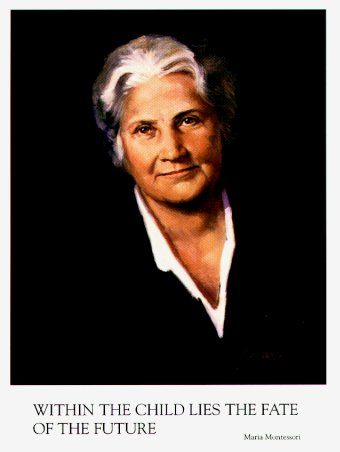Maria Montessori
Today, a determined woman unleashes the inventive mind. The University of Houston's College of Engineering presents this series about the machines that make our civilization run, and the people whose ingenuity created them.
Maria Montessori was born in Italy in 1870. She was a math prodigy. At 24 she was the first woman to graduate from the medical school in Rome. We know Montessori for inventing a radical new scheme for teaching children. She got into that when she started out -- caring for defective children.
Children, she said, are their own best teachers. Adults have as much to learn from children as children do from adults. Give children a rich learning environment. Then give them room to breathe.
Montessori drew ardent support and heated opposition. Her supporters were drawn by her success. Her opposition said she destroyed discipline with her methods.
Montessori was a complex, intriguing woman. She was willful, hard-headed and passionate. On Christmas Eve, 1916, a colleague saw her sobbing in her pew. After Mass they talked. She said,
[They] think I'm a sentimental romantic who dreams only of [kissing children], of telling them fairy tales ... They weary me! I seek to discover the man in the child ... the design of the Creator; the scientific and religious truth. ... I don't need to teach anything to children; it is is they who, placed in a favorable environment, teach me, reveal spiritual secrets as long as their souls have not been deformed.
Montessori's outburst tells us a lot. We catch her intensity. Of course, that crack about deformed souls reveals something else about her. She forced her successes by eliminating failure. She got rid of kids who didn't harmonize with her classrooms. She eliminated troublesome parents and their relatives as well.
But my one small germ of trouble with Montessori is over her philosophy, not her management. She believed we should keep children's feet on the ground. She said:
What we call [creativity] is in reality a composition -- a construction raised on ... material of the mind, which must be collected ... by the senses. ... We are unable to "imagine" things that don't actually present themselves to our senses.
So Montessori surrounded children with sense data. And she steered them away from fantasy.
But is invention no more than reassembled experience? I doubt it. Maybe creativity does rise out of sense data. But it also rides the far rim of sensible reality. If invention really is a leap in the dark, then we limit the gift our children bring by nailing their feet to the ground. Maybe we also misread Montessori when we do.
In any case, Montessori ran on powerful imperatives. One was that we have so much to gain from the children we teach. We realize that gain by seeing through the child's eyes. That was a profound and religious conviction for Montessori. And it can be a powerful creative tool in our hands as well.
I'm John Lienhard, at the University of Houston, where we're interested in the way inventive minds work.
(Theme music)
Berryman, J., Montessori and Religious Education. Religious Education, Vol. 75, No. 3, May-June 1980.

Image courtesy of The Creative Process Inc., Kansas City, MO